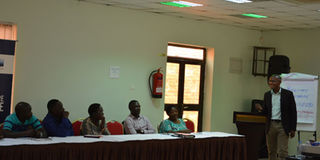Prime
Enterprise Uganda, dfcu Bank train SMEs on sustainability

Dfcu Bank head of business banking Ronald Kasasa (right) takes the entrepreneurs through a session at Piato Restaurant in Kampala last week. Photo BY GODFREY LUGAAJU
What you need to know:
- Challenge. Entrepreneurs say lack of professionalism is the major problem faced by small businesses.
Kampala. Small and Medium Enterprises (SMEs) have been trained on how to beat competition in the ever changing market environment.
The training, organised and funded by dfcu Bank and Enterprise Uganda, was held at Piato Restaurant in Kampala last week.
The workshop, under the theme: Marketing through Customer Care, was aimed at preparing the SMEs for the 2017 edition of the Top 100 Mid-sized company survey currently ongoing.
The head of business banking at dfcu Bank, Mr Ronald Kasasa, said the survey was started to identify, train and further support the Top 100 SMEs in Uganda.
“Dfcu wishes to participate in creating sustainable businesses that will remain for generations to come. Once this is achieved, then we will have played a significant role in creating a stable economy,” Mr Kasasa said
The programme intends to train 480 SMEs this year, targeting 1,000.
In this, the bank wishes to “be the most preferred SME bank in the country.”
According to Ms Rosemary Mutyabule, the director advisory services at Enterprise Uganda, competition is healthy for any business and price reduction alone is no longer a competitive advantage.
“Proper customer service is the only way you can beat competition because when you reduce the price, the competitor will also reduce the price,” she explained.
She added that referrals are also a great step in the direction of conquering your counterparts because one will move to look for a particular enterprise because it was given a good review by a satisfied customer.
Ms Mutyabule explained the need for SMEs to track, monitor, communicate and request for feedback from customers as this will inform them of the areas that need enhancement for better service delivery.
Mr George Mpangi Sewanyana, the managing director of Image Crusade Advertising in Kampala, with 13 employees, said lack of professionalism as a major problem faced by SMEs.
“Our society has a problem of a decline in willing workers, one you employ in bringing up the brand or business could connive and undermine it within the structures or communication tools of the company. That’s common,” he said.
Speaking to Daily Monitor, Ms Mutyabule revealed that Enterprise Uganda receives about 25 cases of customer solicitation every month.
She said: “In a month, out of about 40-50 SMEs that come in, about 50 per cent have this problem. We have big chain stores here and as you are walking through the stalls looking for something to buy, one of the salespersons comes to you and says, madam you want to buy something, I can give it to you at half price. ”
Ms Mutyabule added that if the problem is not addressed, it will lead to the collapse of small businesses.
She stressed that these cases are common in businesses with fast moving consumer goods such as pharmacies and supermarkets, among others.
However, saying the problem is manageable, she urged managers to monitor employees and put in place internal controls to curb this habit.




